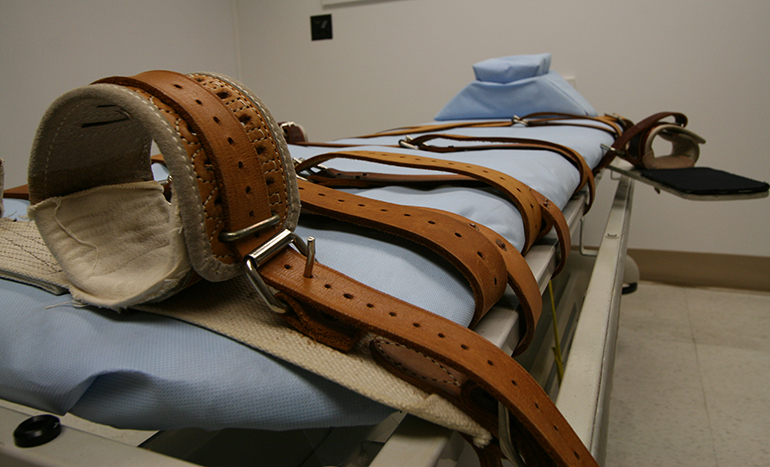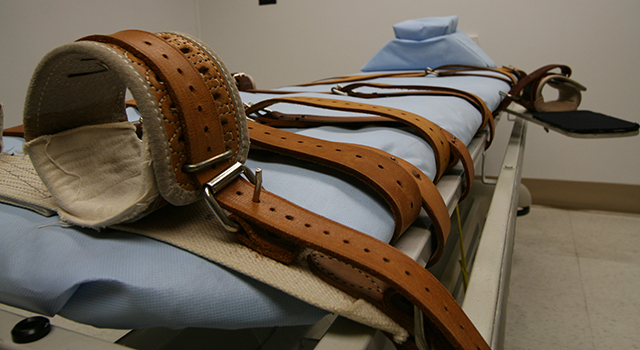By Jean Gonzalez - Florida Catholic - Orlando

Photographer: Florida Dept. of Corrections
View of the gurney in which Florida's death rown inmates are executed.
ORLANDO | A signed death warrant and two pieces of legislation that would upend unanimous jury recommendations have brought capital punishment to the forefront and ire from pro-life advocates in Florida.
On Jan. 23, 2023, Gov. Ron DeSantis signed the death warrant for Donald Dillbeck, who has been on Florida’s death row since 1991, after being found guilty of the 1990 murder of Faye Vann in Tallahassee.
Michael Sheedy, executive director of the Florida Conference of Catholic Bishops, the lobbying arm for Florida’s bishops, wrote a letter on behalf of the bishops to DeSantis urging the governor to stay the execution and commute Dillbeck’s sentence to life without parole because of the “harms caused by implementing the death penalty in Florida.”
He added that the use of the death penalty is “a violation of the dignity of the person and an indictment on the low value placed on human life itself in society.”
“The alternative to the death penalty of life-long incarceration without parole is a severe and more appropriate form of punishment that does not perpetuate the cycle of societal violence by taking someone’s life,” Sheedy wrote. “Moving forward with Mr. Dillbeck’s execution would only further coarsen society’s views on the sacredness of all human life and cause moral injury to the death row staff who must actively participate in his killing after spending years treating him with dignity and respect.”
Sheedy acknowledged that Dillbeck’s “heinous and violent crimes have caused tremendous grief and suffering to the victims’ loved ones and communities.” Dillbeck is also serving life sentences for armed robbery and armed burglary, as well as for the 1979 killing of Lee County Deputy Sheriff Dwight Hall.
Yet, the conference requested that DeSantis consider the mitigating circumstances in Dillbeck’s case, including traumatic physical and sexual abuse that he endured during his childhood, and irreversible brain damage and developmental disabilities as a result of Fetal Alcohol Syndrome. Floridians for Alternatives to the Death Penalty confirmed that Dillbeck suffered physical and sexual abuse at the hands of his alcoholic mother, yet after he was removed from her custody and put into the foster care system, he was not offered any psychological treatment. When Dillbeck killed Hall, he was only 15 years old.
“Four members of his original death penalty jury heard the compelling mitigation of his horrific childhood and his brain damage from prenatal alcohol exposure and voted for a life sentence. In no other state in the country would he have ended up on death row with this vote,” stated a release by Floridians Against the Death Penalty. “In the decades since his 1990 crime, he has been committed to redemption. He has developed meaningful relationships with friends on the outside who still support him today. He found solace in prayer and meditation. He has had no violent incidents in the last three decades. Executing Donald won’t make our state any safer.”
The latest warrant for Dillbeck is the first since the governor signed a warrant in 2019 for James Dailey, who was convicted of the 1985 murder of 14-year-old Shelly Boggio. That execution was delayed by the courts and never rescheduled.
Dillbeck’s execution is scheduled for Feb. 23, and would be the state’s first execution since Gary Ray Bowles was put to death in June 2019. While that is the longest span of time the state has gone without carrying out an execution since 1983, the governor has been quoted as saying the lapse was due to the COVID-19 pandemic and not because of a change of stance on the death penalty.
That point of view was confirmed in 2022 after Nikolas Cruz was sentenced to life in prison for the 2018 Parkland High School shootings that left 17 dead. A majority of the jury voted for life in prison. The judge in the case upheld their recommendation. DeSantis criticized the Broward County jury’s decision to reject the death penalty and the judge for upholding their recommendation.
Although Floridians voted in favor of legislation requiring unanimous jury recommendations for the death penalty, following Cruz’s verdict, DeSantis pushed legislators to introduce Florida House and Senate bills to allow death sentences without a unanimous jury verdict. Senate bill 450/House bill 555 is being introduced during this year’s session, which would allow for a supermajority vote by a jury to recommend a death sentence. A statement from the Florida Conference of Catholic Bishops opposed the legislation and added it would “move Florida backwards and make our state an outlier once again.”
“If our state is going to continue to resort to the death penalty, then it should be applied as fairly and reliably as possible by promoting deliberation and engaging every juror in the process. Justice is better served when a unanimous jury is required to make the grave decision to allow the state to take someone’s life.”
The statement added the conference’s opposition to Senate bill 520/House bill 609, which lets a judge override a jury’s recommendation of life and impose a death sentence.
“It is disturbing that the decision to sentence someone to death could potentially be taken out of the hands of 12 members of a defendant’s peers on a jury and placed into the hands of one judge,” the conference wrote. “Altering the current standards in law when seeking a death sentence will only make it easier to impose death. This is irresponsible in light of the fact that 30 individuals on Florida’s death row have been exonerated thus far. The most severe penalty society can impose should demand the highest standards.”
In an op-ed for City & State Florida, Melanie Kalmanson, a member of the Steering Committee for the American Bar Association’s Death Penalty Representation Project, and Maria DeLiberato, a capital defense lawyer in Tampa and executive director of Floridians for Alternatives to the Death Penalty, warned that the proposed legislation “would significantly reduce the procedural safeguards that ensure the constitutionality of death sentences imposed in Florida. … (T)his new proposal will make Florida an extreme outlier, undermines reliability and confidence in the capital sentencing process, and threatens the finality of all death penalty cases, which ultimately affects victims.”
As of Feb. 12, 2023, the Florida Department of Corrections states there are 299 people (three women and 296 men) currently on Florida’s death row. Since 1973, Florida has had 30 death row exonerations.
In 1976, the U.S. Supreme Court upheld a Florida statute to reinstate the use of the death penalty. The Death Penalty Information Center examined jury outcomes in 25 of those 26 death-row exonerations and discovered only two of those sentencing verdicts had a unanimous jury recommendation for death.


Comments from readers